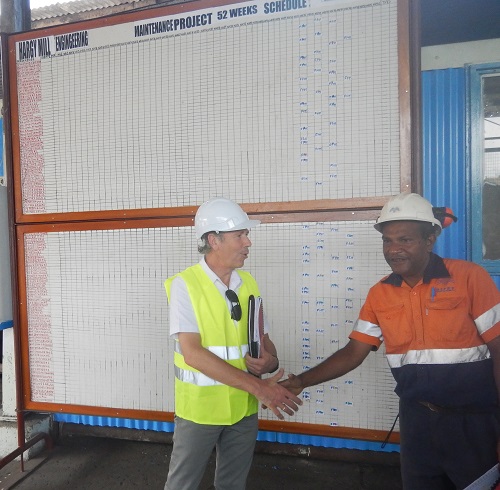The palm oil sector doesn’t have a spotless reputation, but that is rather unfair in the case of producer SIPEF, which puts sustainability first in its plantation operations in Indonesia, Papua New Guinea and Ivory Coast. SIPEF has considerably increased its efforts in the past decade and hopes that European politicians will follow their example by imposing stricter criteria.
2019 is a year of festivities for SIPEF, because the company from Schoten, north of Antwerp, is celebrating its 100th anniversary. In the past century, SIPEF has grown into a frontrunner in the sector of palm oil – a product used in foods, cosmetics and biodiesel – not only economically but also in terms of sustainability. The enterprise also puts the greatest importance on sustainability for its other crops: rubber, tea and bananas.
When a group of international organisations launched RSPO, a sustainability label for palm oil in foods in 2005, SIPEF immediately got on board. “Since our activities already met most of the demands, we didn’t have to take extensive new measures, only adjust our administrative operations,” says CEO François Van Hoydonck. Other labels, such as that of the Rainforest Alliance for other crops, were also quickly obtained.
Air-purifying power
But SIPEF went further than this, on its own initiative, by developing a progressive plantation policy. The three central principles in this: no new use of peat land, no irresponsible deforestation and no social exploitation.
Peat lands are avoided, because they can be compared to sponges that absorb large amounts of carbon dioxide. Using them for plantations leads to significant emission of greenhouse gases. “When you develop one hectare of peat land, about 50 tons of carbon dioxide is released,” explains Van Hoydonck. Existing plantations on peat lands are maintained, because that is more environmentally friendly than phasing them out.
When it comes to deforestation, a common criticism directed towards palm oil companies, SIPEF has shown the sector the way. Before each potential expansion, the company estimates the forest’s air-purifying power. The air-purifying potential of the new palm oil plantation may not be much smaller than that of the forest that would have to make way for it. That calculation, alongside other ecological conditions around forests, is obligatory for all producers that want the RSPO label.
Building up a lead
“A recent study by the World Wide Fund for Nature actually showed that the Belgian use of soy causes three times more deforestation than that of palm oil,” says Van Hoydonck. “Because of the big pressure from NGOs, our sector built up a lead over the competition.”
SIPEF also invests in technology to capture the polluting methane in the wastewater of factories and use it to produce electricity, for their own use and for the local electricity grid. Five of SIPEF’s factories are already equipped with an installation to capture methane and one of these installations has been producing electricity for the public grid for two years.
The firm takes care not only of the environment, but also of the local population, which goes beyond respect for its own staff and the creation of stable welfare in remote areas. SIPEF has even taken over the role of the government in relation to medical care, education and road infrastructure in certain areas of Papua New Guinea.
European criteria
Despite all efforts, SIPEF still occasionally suffers from the stigma attached to palm oil companies. The Norwegian state oil fund, one of the largest institutional investors worldwide, for example, recently pulled out as a shareholder of SIPEF because it didn’t want to be associated with the palm oil sector. “In the meantime, they have admitted that this was a superficial and one-sided decision, which didn’t take our individual policy into account,” says Van Hoydonck.
The fact that only one-fifth (19%) of the global palm oil sector has obtained the sustainable RSPO label doesn’t help to change negative perceptions. According to Van Hoydonck, European legislation should become stricter, to reward the sustainable actors and give the others an incentive to change course. “All palm oil used in Europe is imported,” says the CEO. “So it’s relatively simple to introduce sustainability criteria that separate the wheat from the chaff.”


